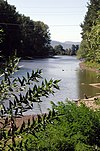The Columbia Slough is a narrow waterway, about 19 miles (31 km) long, in the floodplain of the Columbia River in the U.S. state of Oregon. From its source in the Portland suburb of Fairview, the Columbia Slough meanders west through Gresham and Portland to the Willamette River. It is a remnant of the historic wetlands between the mouths of the Sandy River to the east and the Willamette River to the west. Levees surround much of the main slough as well as many side sloughs, detached sloughs, and nearby lakes. Drainage district employees control water flows with pumps and floodgates. The Oregon Department of Environmental Quality and the city's Bureau of Environmental Services deal with environmental issues. Early attempts to mitigate the pollution, which included raw sewage and industrial waste, were unsuccessful. However, in 1952 Portland began sewage treatment, and over the next six decades the federal Clean Water Act and similar legislation mandated further cleanup. One of the nation's largest freshwater urban wetlands, Smith and Bybee Wetlands Natural Area, shares the lower slough watershed with a sewage treatment plant, marine terminals, a golf course, and a car racetrack. Watercraft able to portage over culverts and levees can travel the entire length of the slough. (more...)
Recently featured: Halley's Comet – Panzer I – The Battle of Alexander at Issus
